cumprod solution: (very efficient)
>> pf = cumprod(f);
>> x = prod(g).*pf(numel(g):end)./[1 pf(1:(end-numel(g)))]
x =
144 648 1134 378
This first takes the cumulative product of f using cumprod. By dividing each element by the cumulative product 3 elements before it, we get the product of each numel(g)-wide sliding window along f. Then just multiply by the product of the elements of g.
NOTE: When f has many elements, or extreme values (large or small), you could run into issues with accuracy or underflow/overflow when performing the cumulative product. One potential way to mitigate this would be to apply a scaling to f before the cumulative product, then undo it afterward:
c = ...set a scaling factor...
pf = cumprod(f./c);
x = prod(c.*g).*pf(numel(g):end)./[1 pf(1:(end-numel(g)))];
The choice for c could be something like mean(abs(f)) or max(abs(f)) so that the scaled f gives results that are better bounded (i.e. values closer to 1). This doesn't appreciably change the timing results below.
hankel solution: (not as efficient but still interesting)
>> x = prod(g).*prod(hankel(f(1:numel(g)), f(numel(g):end)))
x =
144 648 1134 378
The call to hankel creates a matrix where each column has the contents of one of the numel(g)-wide sliding windows in it. Taking the product down each column then multiplying by the product of the elements of g gives your answer. However, for large vectors f and/or g this could involve a lot of extra computation and use a lot of memory.
Timing the results:
I tested 6 solutions (the loop in your question, 2 solutions from rahnema (conv(log) and movsum(log)), the bsxfun solution from Luis, and my cumprod and hankel solutions) using f = rand(1,1000000); and g = rand(1,100); and averaging over 40 iterations. Here's what I got (running Windows 7 x64, 16 GB RAM, MATLAB R2016b):
solution | avg. time (s)
------------+---------------
loop | 1.10671
conv(log) | 0.04984
movsum(log) | 0.03736
bsxfun | 1.20472
cumprod | 0.01469
hankel | 1.17704


